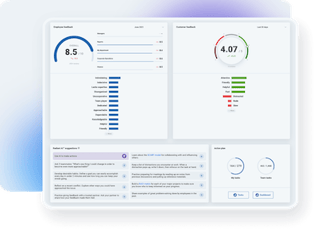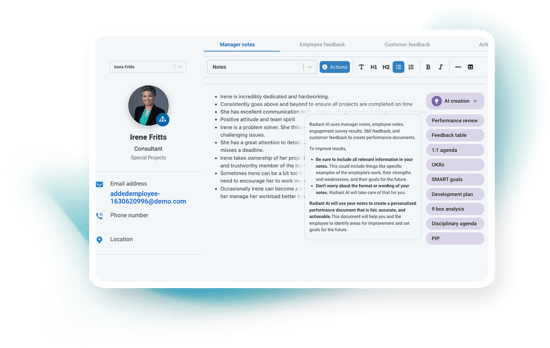
Unlocking Organizational Success Through Manager Enablement: A Comprehensive Guide
In today's competitive business landscape, organizations are increasingly recognizing the critical role of effective manager enablement in achieving organizational success. Previously, we talked about what exactly defines manager enablement. In short, manager enablement encompasses the process of equipping managers with the skills, knowledge, and resources they need to effectively lead, motivate, and develop their teams. By empowering managers to become catalysts for organizational growth, companies can foster a more engaged and productive workforce, enhance employee retention, and ultimately achieve their strategic objectives.
Why Manager Enablement Matters
Effective managers play a pivotal role in shaping the employee experience and driving organizational performance. They are the first line of defense in addressing employee concerns, providing guidance and support, and fostering a positive work environment. When managers are well-equipped and empowered, they can effectively:
- Increase Employee Engagement: Engaged employees are more productive, innovative, and committed to the organization's success. Managers who can create a positive and supportive work environment can significantly boost employee engagement levels.
- Improve Performance: Effective managers can set clear expectations, provide timely feedback, and coach their team members to reach their full potential. This leads to improved individual and team performance.
- Reduce Turnover: Managers who can build strong relationships with their team members and address their concerns can help reduce employee turnover, saving the organization the significant costs associated with recruitment and onboarding new talent.
- Drive Innovation: When managers create a culture of trust and psychological safety, employees feel more comfortable sharing ideas and taking risks, leading to increased innovation and problem-solving.
- Strengthen Leadership Pipeline: By developing the skills and leadership potential of their managers, organizations can create a robust leadership pipeline, ensuring a continuous supply of capable leaders to navigate future challenges and opportunities.
The Pillars of a Comprehensive Manager Enablement Program
When you decide to create a manager enablement program, it's crucial to understand that effective management involves more than just overseeing tasks. Managers today need leadership, communication, and strategic thinking skills to truly excel.
Creating a successful manager enablement program requires a comprehensive approach. This includes key components that help managers grow as leaders and strategic thinkers. These components provide managers with the tools they need to inspire their teams and contribute to the organization's success.
In essence, a manager enablement program is an investment in your organization's future. It's about empowering managers to lead, communicate, and think strategically, driving your organization forward. Building a successful manager enablement program requires a strategic and holistic approach that encompasses the following key components:
1. Needs Assessment
A thorough needs assessment is crucial to identify the specific skills, knowledge, and resources that managers need to be more effective. This assessment allows for a targeted and tailored approach to manager enablement, ensuring that the program addresses the most critical areas of development.
Why it's critical: Understanding the specific needs of managers is essential to avoid wasting resources on training or development that is not relevant or aligned with their actual requirements. A targeted approach ensures that the program addresses the most pressing challenges and skill gaps faced by managers.
Examples:
- Conduct surveys with managers to identify their perceived strengths, weaknesses, and areas for development.
- Hold focus groups with managers to gather insights into their specific challenges and needs.
- Interview managers one-on-one to gain a deeper understanding of their individual needs and aspirations.
- Analyze performance data to identify areas where managers may need additional training or development.
2. Goal Setting
Establishing clear and measurable goals for the manager enablement program is essential for tracking progress, evaluating effectiveness, and demonstrating the value of the program. Goals should be specific, measurable, achievable, relevant, and time-bound (SMART) and align with the overall objectives of the organization.
Why it's critical: Without clear goals, it is difficult to determine whether the manager enablement program is achieving its intended outcomes. SMART goals provide a framework for measuring progress, identifying areas for improvement, and communicating the impact of the program to stakeholders.
Examples:
- Align manager enablement goals with the overall strategic objectives of the organization.
- Establish clear and measurable goals for each manager, ensuring they are specific, achievable, relevant, and time-bound (SMART).
- Involve managers in the goal-setting process to foster ownership and commitment to the program.
- Regularly review and update goals as the organization's needs and priorities evolve.
3. Training and Development
Providing managers with access to training and development programs that address both technical and soft skills is essential to equip them with the knowledge and abilities they need to effectively lead, motivate, and develop their teams.
Why it's critical: Managers need a comprehensive skill set to excel in their roles, including technical expertise in their respective fields, leadership skills, communication skills, conflict resolution skills, and problem-solving abilities. Training and development programs can help managers acquire and enhance these essential skills.
Examples:
- Provide a variety of training and development options to cater to different learning styles and preferences.
- Offer blended learning programs that combine traditional classroom instruction with online modules and self-paced learning.
- Utilize technology-based training platforms to provide managers with access to on-demand learning resources.
- Partner with external training providers to offer specialized courses and workshops on specific topics.
4. Mentorship and Coaching
Mentorship and coaching programs provide managers with ongoing support, guidance, and feedback, helping them develop their skills, address challenges, and navigate the complexities of their roles. Mentors offer valuable insights and experience, while coaches provide personalized support and guidance for skill development and performance improvement.
Why it's critical: Mentorship and coaching provide managers with a personalized and supportive learning environment, allowing them to learn from experienced professionals and receive tailored feedback on their performance. This ongoing support is crucial for helping managers overcome challenges, make informed decisions, and grow professionally.
Examples:
- Implement an AI manager coaching platform to provide personalized, data-driven feedback and learning opportunities, enhancing the development of managerial skills.
- Establish a formal mentorship program that pairs experienced managers with new or less experienced managers.
- Provide coaches with specialized training and support to ensure they are equipped to effectively guide and support managers.
- Encourage peer-to-peer coaching and mentoring to foster a culture of learning and collaboration.
- Incorporate coaching and mentoring into the performance management process to provide ongoing feedback and development opportunities.
5. Performance Management
Building upon our previous discussion of manager enablement versus performance management, a robust performance management system empowers managers with clear feedback, performance expectations, and opportunities for growth and development. This system should encompass regular performance reviews, goal-setting exercises, and feedback mechanisms to facilitate manager-team member communication and input.
Why it's critical: Effective performance management helps managers understand their strengths and areas for improvement, set clear goals for their teams, and provide timely feedback and guidance to their team members. This process fosters accountability, transparency, and continuous improvement within the organization.
Examples:
- Implement a structured performance management system that includes regular feedback sessions, goal setting exercises, and performance reviews.
- Utilize performance data to identify areas where managers can improve and provide targeted development opportunities.
- Encourage managers to involve their team members in the performance management process to foster transparency and accountability.
- Recognize and reward managers who consistently demonstrate high performance and contribute to the organization's success.
6. Empowerment and Autonomy
Empowering managers with the autonomy and authority to make decisions and take action within their areas of responsibility is essential to foster a culture of ownership, innovation, and problem-solving. This empowers managers to be more responsive to the needs of their teams and take ownership of their work.
Why it's critical: When managers feel empowered and trusted, they are more likely to take initiative, make informed decisions, and lead their teams with confidence. This autonomy can lead to increased innovation, improved problem-solving, and a more engaged workforce.
Examples:
- Delegate decision-making authority to managers, allowing them to make informed choices within their areas of responsibility.
- Encourage managers to take ownership of their teams' performance and provide them with the resources they need to succeed.
- Create a culture of trust and psychological safety where managers feel comfortable taking risks and experimenting with new ideas.
- Provide managers with opportunities to participate in strategic decision-making processes to enhance their sense of involvement and ownership.
7. Recognition and Rewards
Recognizing and rewarding managers who are effectively implementing the skills and knowledge they acquire through training and development programs is essential to reinforce positive behavior, encourage continued engagement in the program, and motivate others to strive for excellence.
Why it's critical: Recognizing and rewarding managers' achievements demonstrates the organization's commitment to their development and reinforces the value of the manager enablement program. This positive reinforcement can lead to increased motivation, improved morale, and a culture of appreciation within the organization.
Examples:
- Implement a formal employee recognition program that specifically recognizes and rewards managers for their achievements.
- Publicly acknowledge managers' contributions at team meetings, company events, and newsletters.
- Offer non-monetary rewards, such as additional paid time off, leadership development opportunities, or special privileges.
- Link manager compensation and bonuses to their performance and achievement of goals.
8. Continuous Measurement and Evaluation
Regularly measuring and evaluating the effectiveness of the manager enablement program is crucial to identify areas for improvement, make adjustments as needed, and demonstrate the program's impact on the organization's success. Metrics such as employee engagement, performance improvement, and retention rates can be used to assess the program's effectiveness.
Why it's critical: Continuous evaluation ensures that the manager enablement program is adapting to the organization's evolving needs and delivering the desired outcomes. By tracking key metrics and evaluating the program's impact, organizations can make data-driven decisions to optimize the program and maximize its contribution to organizational success.
Examples;
- Track key metrics such as employee engagement, performance improvement, and retention rates to assess the impact of the manager enablement program.
- Conduct periodic surveys with managers to gather feedback on the program's effectiveness and identify areas for improvement.
- Engage external consultants or experts to conduct program evaluations and provide objective assessments.
- Utilize data analytics tools to identify trends and patterns in manager performance and development.
Making Manager Enablement a Strategic Imperative
Manager enablement should not be viewed as a one-time event or a standalone initiative. It should be an ongoing process that is embedded into the organization's culture and values. Here are some key steps to make manager enablement a strategic imperative:
- Executive Commitment: Gain the support and commitment of senior leadership to ensure that manager enablement is prioritized and receives the necessary resources and attention.
- Alignment with Strategic Goals: Integrate manager enablement goals with the organization's overall strategic objectives, ensuring that it contributes directly to achieving the desired outcomes.
- Comprehensive Program Development: Design a comprehensive manager enablement program that encompasses training, development, mentorship, coaching, performance management, and recognition initiatives.
- Continuous Measurement and Evaluation: Regularly measure and evaluate the effectiveness of the manager enablement program, using data to identify areas for improvement and make adjustments as needed.
- Cultural Integration: Embed manager enablement into the organization's culture by emphasizing the importance of continuous learning, development, and growth for all managers.
- Investing in Expertise: Consider hiring dedicated manager enablement specialists or partnering with external experts to provide guidance and support for program implementation and evaluation.
- Communicating the Value: Effectively communicate the value and impact of manager enablement to all stakeholders, including managers, employees, and senior leadership.
While this can sound daunting, software platforms can make this easy. Macorva MX, a comprehensive platform for manager experience, can be a key tool in your manager enablement strategy. Its AI-generated performance reviews provide unbiased evaluations, while its personalized development plans cater to individual needs. The platform aligns individual goals with company objectives through AI-generated OKRs and SMART goals, ensuring that manager enablement is directly tied to strategic outcomes. Macorva MX also offers a centralized location for all employee performance data, making it easier to measure and evaluate the effectiveness of your manager enablement program. By saving managers over 100 hours a year, the software allows them to focus more on their growth and development, reinforcing the culture of continuous learning. With its ability to integrate with your existing systems, Macorva MX can seamlessly fit into your manager enablement program, enhancing its effectiveness and impact.
By integrating manager enablement into the organization's strategic planning, talent management, and performance management systems, companies can create a supportive environment where managers are empowered to become catalysts for organizational success.
Key Takeaways
Manager enablement is a strategic imperative for organizations that seek to achieve sustainable growth and success in the ever-evolving business landscape. By investing in their managers, organizations can reap significant benefits, including a more engaged and productive workforce, improved performance, reduced turnover, and enhanced innovation.
A comprehensive manager enablement program incorporates several critical components: from needs assessment and goal setting to training and development, mentorship, performance management, and fostering empowerment. Recognition and rewards, alongside continuous monitoring and evaluation, are also integral to its success.
By prioritizing manager enablement, organizations set their managers up to be key drivers of success, enhancing employee engagement, performance, innovation, and ultimately achieving strategic objectives.








